Bitter Moon (1992)
Directed by: Roman Polanski
Written by: Gérard Brach, John Brownjohn, Roman Polanski
Starring: Emmanuelle Seigner, Hugh Grant, Kristin Scott, Peter Coyote
BITTER MOON (1992)
FRANCE/UK
AVAILABLE ON BLU-RAY [REGION ‘A’ AND ‘B’ ITALY ONLY], DVD and DIGITAL
RUNNING TIME: 139 mins
REVIEWED BY: Dr Lenera
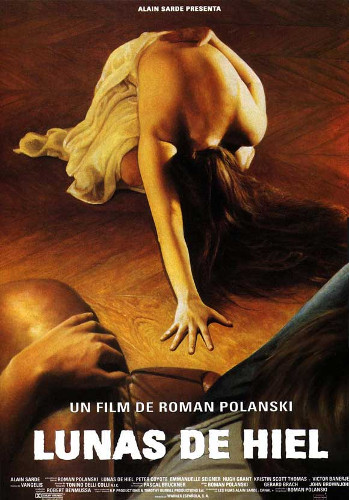
British couple Nigel and Fiona Dobson are on a Mediterranean cruise ship to Istanbul en route to India, celebrating their seventh wedding anniversary. They encounter French woman, Mimi, and her much older and disabled American husband Oscar, who’s cynical and a failed writer. Oscar invites Nigel to his cabin where he tells him the story of their relationship, a relationship that explored many kinds of sexuality and was very much of the love hate variety. After each installment, Nigel relates all to Fiona while becoming increasingly fascinated by Mimi who seems to provoke him..
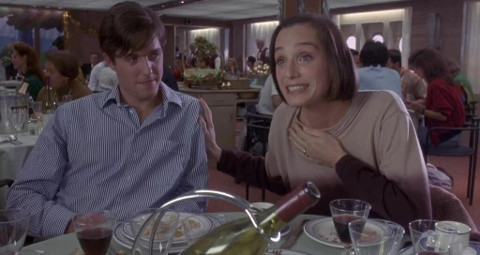
I didn’t really get Bitter Moon when it came out. Was it supposed to be a dark comedy or nihilistic melodrama? Why were its sexy scenes so unsexy? What was the point of the roles played by Hugh Grant and Kristin Scott Thomas except to have yet another situation of an English sap excited by the possibility of a fling with a sexy French woman? Why does Emmanuelle Siegner’s character seem to have several personalities? But of course viewing at again after so many years provided the answers to all of those things and that is was actually a very fine, perceptive film which, despite its over the top elements, manages to ring true in many ways. Its depiction of love is a wicked one, but I reckon that most people who’ve actually experienced relationships will be able to relate to its themes of possessiveness and destruction, of selfishness and selflessness, or revenge and acceptance, and of all-consuming desire – it’s just that it’s all heightened in that somewhat absurd, somewhat funny and somewhat disturbing Roman Polanski way, the story being another opportunity for him to again explore some of his favourite themes such as madness and how one can be both torturer and victim, in what is partly a throwback to his first feature A Knife In The Water, which had three characters on a boat involved in emotional and sexual games. He perhaps pushes things when he seems to go for blatant corniness which he rarely did, but it seems to me that this is deliberate; firstly he’s being deliberately ironic, and secondly he’s just having fun. Polanski’s humour often doesn’t work for many but Bitter Moon does have a surprisingly light touch considering its plot, and understands that, if you look at things from different angles, life can sometimes be funny and cruel at the same time.
The source material was the 1981 novel ‘Lunes de fiel’ [a pun on ‘Lune de miel’, the French word for “honeymoon] by Pascal Bruckner, which was eventually published in England and the United States under the title ‘Evil Angels’. Polanskii had lost some of his reputation by the time he became interested, and hadn’t had a hit since Chinatown in 1974. In the ’80s, Pirates was a huge flop, though the modest Frantic was a minor success. He and his usual collaborator Gerard Brach planned to make a film of Mikhail Bulgakov’s darkly comedic religious novel ‘The Master and Margarita’, but backers Warners backed out due to expense. However, Bitter Moon was more to their taste as it would require less money to be spent on it. He, Brach and John Brownjohn changed a fair bit, including the names, lowering the age ofnMimi who was originally a similar age to Oscar, and the ending where Nigel originally was put in a Turkish prison. Polanski wanted Jack Nicholson to star, then when he was unavailable went for James Woods who dropped out. Peter Coyote threw himself into the role and improvised when a dog wouldn’t lick his toes while his character was being fellated; he just grabbed the dog as he was supposed to climax and Polanski left it in. A scene involving a golden shower was in the script, but Polanski cut it, saying it would be better just spoken of, but would it have passed the censors? It was shot at the Paris Studio Cinema, Billancourt, several Paris locations and the ‘MTS Odysseus’. It did okay business in mainland Europe but the delayed by two years US release flopped, partly because by then Polanski had made another film – Death And The Maiden – which got released around the same time and which, due to its nature, got much more critical attention and respect even if it was hardly a hit.
The opening shot under the titles is of the sea like in countless much older movies, a calm sea that will of course get stormier as things get stormier inside the ship involving the main characters. Polanski at his cheekiest in this film; at one point tensions raise in a restaurant and Mimi later comes home to see an angry Oscar watching Once Upon A Time In America on TV, and the scene where Noodles takes Deborah for a meal in a lavish restaurant which has the most horrible aftermath. Another scene in a restaurant refers to a one in Blood For Dracula which Polanski acted in, while another has two characters have sex in a room but we don’t see it; instead the camera slowly tracks away from them to alight on somebody else’s pained reaction. Archetypal repressed English couple Nigel and Fiona seem to have wandered in from a Merchant/Ivory production; look out for the bit where he sets off for Nigel’s room but briefly comes back into his and Fiona’s room to grab his blazer. They find Mimi very seasick in the toilets and help her out; then Fiona goes to bed early because she’s supposedly boring and Nigel goes to the bar where Mimi is dancing on her own to the jukebox. His attempt to chat her up is a total disaster, though one can chuckle rather than yawn because this was 1992 and the hugely annoying screen persona that Grant adopted hadn’t really become a thing yet. Then he meets her wheelchair-bound husband Oscar. “Look what she did to me” he says, letting us know already the main event that happens much later in the film. Should this have been withheld from us so it’s a surprise later?
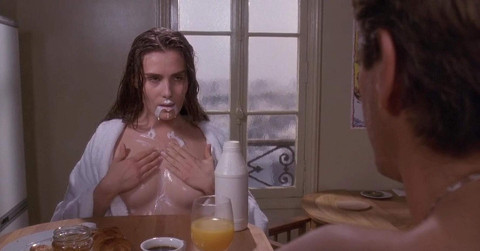
Oscar gets Nigel into his room and starts to tell him and us a story. He spouts cliches and tries badly to be poetic, but I don’t think that this is because of bad screenwriting. It’s because Oscar is a struggling writer who, even when he does become capable of producing something, never gets anything published, so his telling of this tale would obviously show the low quality of his writing and also show his ego in finally having an audience. After his first sex with Mimi, his narration treats us to: “Nothing ever surpassed the rapture of that first awakening. I might have been Adam with the taste of apple fresh in my mouth. I was looking at all the beauty in the world embodied in a single female form and I knew, with sudden blinding certainty, this was it!” He first sees her on a bus numbered 69 [no doubt deliberately], sat at the back so we notice back projected streets outside the so-called window behind her even though by 1992 few filmmakers would have used back projection for this shot. She doesn’t have a ticket, so he secretly gives her his and gets off the bus. Totally besotted, he hangs around the buses and bus stops in the area and then, when she comes to serve him in a restaurant, ignores his date to go and ask her to go out to dinner with him as well! They spend the whole night getting to know each other then, when he brings her breakfast, she’s the one who initiates sex which takes place by a fire with very cliched closeups. Everything is a bit rose tinted and soft, with some of Vangelis’s dreamiest music of the period, the couple take a fairground ride on separate cars and touch hands in slow motion while he tells her that he loves her; it’s almost too much, and that’s intentional, because things rapidly change with a cut to them both in wedding gear; but they aren’t married, they’re still at the fairground.
He may say that he loves her but considers sex to be the only thing of importance. She certainly loves him and is very needy so she complies. But when the physical side of things peaks so early, things can run out of steam if a relationship lacks depth, and Oscar and Mimi desperately resort to things like role playing, bondage and voyeurism to maintain interest. Eventually Oscar dumps her so he’s free to resume his favourite pursuit; having as many flings as possible. Mimi begs him to take her back, and he does. When she played the role of the dominant it was all about pleasing him in the bedroom, but now he’s the one in charge, and he takes domination totally for real with emotional and psychological cruelty, from saying somebody else’s name in bed to telling her she looks like his neighbour’s dog, revealing his true colours as a person. Mimi seems willing to take a lot, but she will take her revenge, thereby reversing the roles. Even though Seigner shows all several times, there’s very little sex actually seen on screen and some scenes, notably Oscar on all fours making pig noises and wearing a pig mask, aren’t erotic except for a very small sector of society, but I don’t like Polanski is trying to be sexy, he’s trying to emphasise the absurdity of this couple attempting to continuously push the boundaries while seemingly not knowing that they shouldn’t need to. And he’s also just having fun. At one point Mimi spills milk all over herself at breakfast and approaches Oscar, who quickly obliges to ‘clean it up’. As their passion pushes their writhing bodies towards a state of heightened sensation, smoke rises from the toaster in the background. As Oscar groans with pleasure, the two burnt pieces of toast pop out and arc gracefully to the floor.
Nigel listens and acts embarrassed and shocked but maybe wants to experience some of this excitement with Mimi. He’s a fill in for us, who can also ask moral questions like do we or should we accept a relationship like this? Surely people should be able to do what they want in their own homes, yet this affair is destructive to both participants. Fiona is enigmatic, supposedly boring yet revealing a hidden nature twice towards the end. I said at the start of this review that Mimi seems to have several different personalities, but these days I don’t always see that as a flaw, because, actually, many of us have several different personalities, and Mimi is an insecure, needy woman who’s treated so poorly that she snaps. We like her much more when she takes control and gives it back to Oscar than when she was the pathetic doormat, while Oscar we never warm to even if we may have have some pity for him. Coyote doesn’t really let us in, but maybe that was the intention. Seigner, in only her second role, is simply astonishing in her complex part. Performers rarely get a chance to go as far in today’s staid film environment. I don’t see the point of the Indian father and daughter Nigel and Fiona meet on the ship, unless it’s to provide a dignified antidote, and I wasn’t sure we needed to have a comic bar fight near the end with even a couple of martial arts moves, even though I enjoyed it all the same. But Bitter Moon is a major later work from Polanski which deserves much re-evaluation; it’s had some but not as much as it deserves, though that’s unlikely for a while seeing as we currently live in a hysterical, controlling, backwards PC climate where Polanski’s award winning latest film is only being shown in cinemas and/or home media in a few mainland European countries with no English subtitles. But at least we can appreciate his cautionary tale of passion going wrong, his acerbic, funny yet perceptive and penetrating look at relationships which reminds us that we all have those dominant and submissive elements within us that we can use for fun or for real. And I have the feeling that the story of Nigel and Fiona is only just beginning.
Rating: 











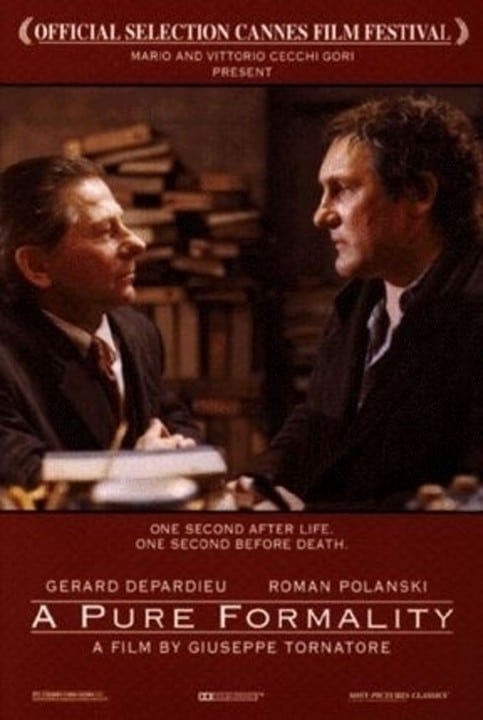
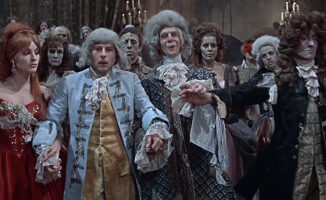

Be the first to comment